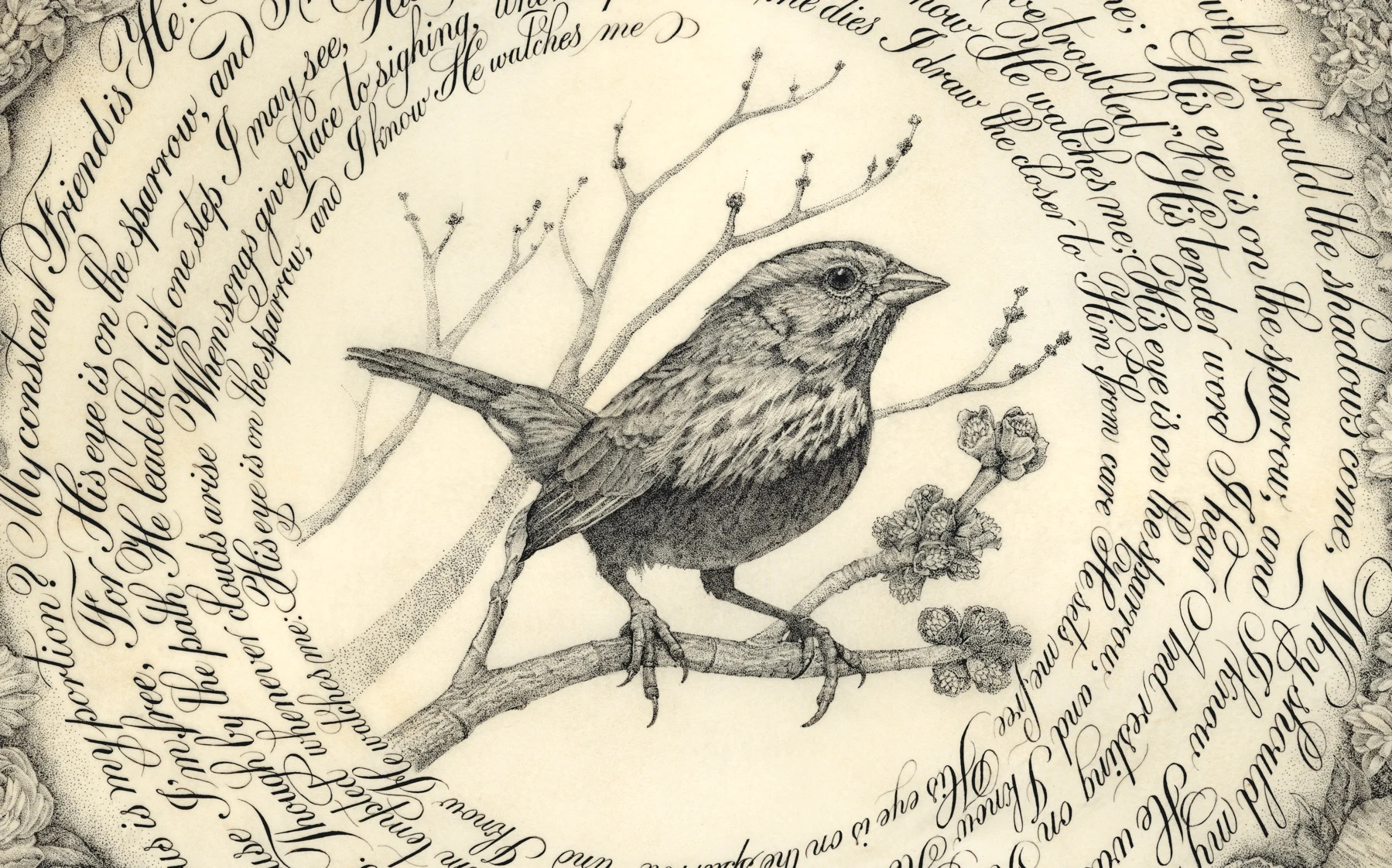Carillon Notes – February 2021
Tuesday, February, 2nd, 2021 Carillon Tune

Tune name: His Eye is on the Sparrow
Occasion: Commemoration of the Rev. Dr. Martin Luther King, jr., Black History Month and Black Legacy Month
In 1905, Civilla D. Martin and her husband, the Rev. Dr. Walter Martin, were staying in Elmira, New York where they made friends with a couple, who despite major disabilities (the wife was bedridden, and the husband needed a wheelchair) lived a full and seemingly happy life. Rev. Martin asked the wife how they remained so hopeful and her reply was “His eye is on the sparrow, and I know He watches me.” This declaration inspired Ms. Martin to write the hymn text and to use that line as the second half of the refrain. Her husband tried to write music for her text but was unhappy with what he had written, so they sent the words to a professional composer, Charles H. Gabriel, who wrote the music that we know today.
Why the sparrow? References to birds occur a few times in the Bible but the reference most commonly given with this hymn is from the Gospel of Matthew, where Jesus is sending his followers off on their mission of healing and ministry. He tells them that they will meet adversity and persecution, but that they should not be afraid, and if they are no longer welcome in one town, they should go to the next so that they will go through all of the towns of Israel. Jesus says to them:
“Are not two sparrows sold for a penny? Yet not one of them will fall to the ground apart from your Father. And even the hairs of your head are all counted. So do not be afraid; you are of more value than many sparrows.” — Matthew 10:29-31 (New Revised Standard Version)
Jesus uses the sparrow comparison to remind his disciples that God cares for them constantly, deeply, and particularly in trying times. If I were asked to categorize “His Eye is on the Sparrow” I would call it a hymn of consolation but also one of steeling yourself against adversity. To hear a voice like Mahalia Jackson sing it (see the link below), you know that the singer has absolutely no doubt in her mind or in her soul that God is protecting her, come what may.
In these days of difficulty and uncertainty due to political unrest, violence, pandemic, and whatever may be bothering us, we all need something to be a source of comfort and solace. I offer this hymn as that for you today. Although a traditional Christian hymn, I hope that its beauty and constancy can be inspiring to people of all faith traditions or of no faith tradition at all – such is the power of music. The late Fred Rogers, who in addition to being a children’s television icon was also an ordained Presbyterian minister, used to say that we all have people who have “loved us into being” who we can remember when we need them, whether they are “nearby, far away, or even in heaven.” Perhaps take a moment as you listen to this hymn to listen to the words and remember those people in your own life.
Text of the hymn:
Why should I feel discouraged, why should the shadows come,
Why should my heart be lonely and long for Heav’n and home,
When Jesus is my portion? My constant Friend is He:
His eye is on the sparrow, and I know He watches me.
I sing because I’m happy, I sing because I’m free,
For His eye is on the sparrow, and I know He watches me.
“Let not your heart be troubled,” His tender word I hear,
And resting on His goodness, I lose my doubts and fears:
Though by the path He leadeth but one step I may see:
His eye is on the sparrow, and I know He watches me.
I sing because I’m happy, I sing because I’m free,
For His eye is on the sparrow, and I know He watches me.
Whenever I am tempted, whenever doubts arise,
When songs give place to sighing, when hope within me dies,
I draw the closer to Him, from care He sets me free;
His eye is on the sparrow, and I know He cares for me.
I sing because I’m happy, I sing because I’m free,
For His eye is on the sparrow, and I know He watches me.
— Thomas Dawkins, Music Director
Further listening:
https://youtu.be/TV19P73HFBs sung by Ethel Waters at a Billy Graham “Crusade” in 1957.
https://youtu.be/Sr1OTWIk4eA sung by Mahalia Jackson in 1958 with Mildred Falls at the piano and Lilton Mitchell at the Hammond organ.
https://youtu.be/dpyLoHyqlFI sung by Jennifer Holliday in 1987 at “The All-Star Gospel Session” taped for HBO TV. The choir is the Edwin Hawkins Singers.